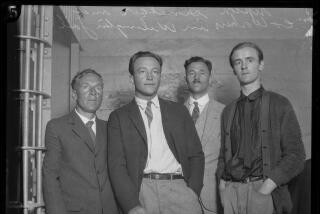Harold W. Snider dies at 61; blind activist helped craft disability legislation
Harold W. Snider, a prominent advocate for the blind who helped craft legislation that expanded the civil rights of Americans with disabilities and aided in the launching of an audible newspaper service, died June 26 at his home in Rockville, Md., after a heart attack. He was 61.
While growing up in Jacksonville, Fla., Snider said he was forced out of regular third-grade classes because he was blind. His parents successfully sued the Duval County school system, and Snider became the first blind student in the county to graduate from public school.
The experience sparked Snider’s interest in advocacy, and in the mid-1970s he reportedly became the first blind employee of the Smithsonian Institution. As a handicap program coordinator for the fledgling National Air and Space Museum, he worked to make the facility a vivid experience for the sight-impaired.
“You can’t look at the spacecraft, so you touch it, or you hold a model of it or a raised line picture of it,” Snider told United Press International in 1976. “You can’t see an airplane, so you hear its engine roar.”
In 1978, he started Access for the Handicapped, a consulting company focusing on policy, technology and resources for people with disabilities. Through his company, he worked on projects for people with disabilities around the world, including ventures in Zambia, Ecuador and South Korea.
After Snider worked on disability issues for the Republican National Committee, President George H.W. Bush appointed him in 1990 as deputy executive director of the National Council on Disability. In that role, he served as a liaison among the council, the White House, Congress and the media.
He also helped draft the sweeping Americans With Disabilities Act of 1990, which broadened civil rights protected in earlier legislation. The act guarantees protection of disabled people from discrimination in the public and private sectors regardless of whether agencies or businesses receive federal aid.
After Snider left the council in 1992, he worked in conjunction with the National Federation of the Blind to develop NFB-Newsline, a free dial-to-listen newspaper and magazine service that includes daily editions of the Los Angeles Times, the Washington Post, the New York Times and the Wall Street Journal among its more than 250 publications. It debuted in 1994 and serves more than 50,000 users.
Harold Wexler Snider was born Sept. 6, 1947, in Jacksonville. The son of a dentist, he graduated in 1969 from Georgetown University’s School of Foreign Service, where he was elected to the Phi Beta Kappa honor society. Snider told UPI that he was not allowed to take the Foreign Service examination because of prejudice.
In 1970, he received his master’s degree in British imperial and commonwealth history from the University of London and did postgraduate work at the University of Oxford.
About this time, he married Gail Lovelace, a British woman who also was blind. They divorced in 1994, and he married Linda Fossett the same year. All three remained on good terms, with the two wives calling each other “wives-in-law.”
Survivors include his second wife, two children from his first marriage, three stepchildren, his mother, two sisters and three grandchildren.
Shapiro writes for the Washington Post.
More to Read
Start your day right
Sign up for Essential California for the L.A. Times biggest news, features and recommendations in your inbox six days a week.
You may occasionally receive promotional content from the Los Angeles Times.






